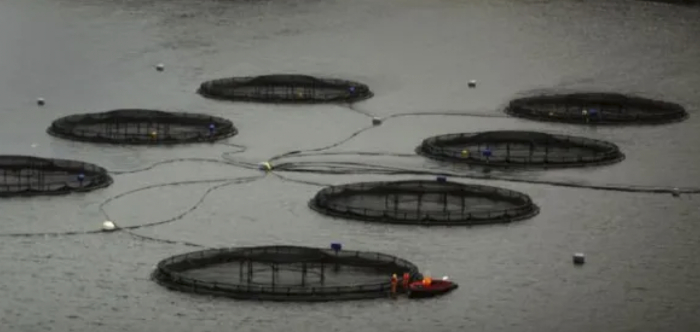The Galway Bay Against Salmon Cages (GBASC ) group says it is very concerned about a new emerging bacterial disease called salmonid rickettsial septicaemia (SRS ) also known as Piscirickettsiosis which is causing huge mortalities on Irish salmon farms, including in the west.
Spokesman Billy Smyth told the Galway Advertiser this week that members do not know how long this disease has been in Irish organic salmon farms, but this is the first time they have seen it listed in Marine Institute (MI ) mortality reports as a cause of high mortality of farmed salmon in Ireland.
“GBASC fears that this new fish disease, on top of the ones that are already endemic on Irish salmon farms, will have a further devastating effect on our wild salmon and sea trout stocks. Other marine species may also be at risk,” he added.
“SRS or Piscirickettsiosis is considered to be the most important disease problem in the Chilean salmon farming industry with economic losses of over $100 million in some years. SRS was first reported from Chile in 1989, but (Pisci )rickettsia-like organisms are now frequently associated with disease syndromes in both salmonid and non-salmonid fish from both fresh and salt waters worldwide. SRS is a highly infectious disease and is believed to be transmitted by fish to fish contact.
Affected fish are lethargic, dark in colour, anorexic, anaemic with mottled focal lesions within the liver, show respiratory problems and swim near the surface. The first signs observed are often hemorrhages and lesions of the skin. The kidney is swollen and the spleen enlarged. Petechial haemorrhages are found on the swim bladder and viscera. Diagnostic ring-shaped, cream-coloured lesions are present on the livers of chronically infected fish. However, in acute cases, death may be the only gross sign of disease.
The only way to control this disease is by vaccination of antibiotics such as penicillin, penicillin G and spectinomycin because the use of medicated feed has been largely unsuccessful.
Mr Smyth said that in Access to Information on the Environment Regulations (AIE ) documents received by GBASC from the Marine Institute they note that there was an outbreak in Connemara last August.
“Galway Bay Against Salmon Cages believes that the true extent of mortality is under-reported as a number of salmon farms are not reporting their losses. With fish mortality averaging about 40% annually on Irish organic salmon farms and massive amounts of feed containing wild fish wasted on these mortalities, it is now time for the Irish Government and especially Minister Charlie McConalogue, in this time of climate and species extinction crises, to stop supporting the expansion of this unlicenced, unsustainable, environmentally damaging and unregulated industry.
“The scientific evidence is staring the minister in the face to allow him to transition all open sea cage salmon farms out of our bays which would help save our wild fish stocks. This must be done before it is too late to save our wild iconic salmon and sea trout,” he concluded.

